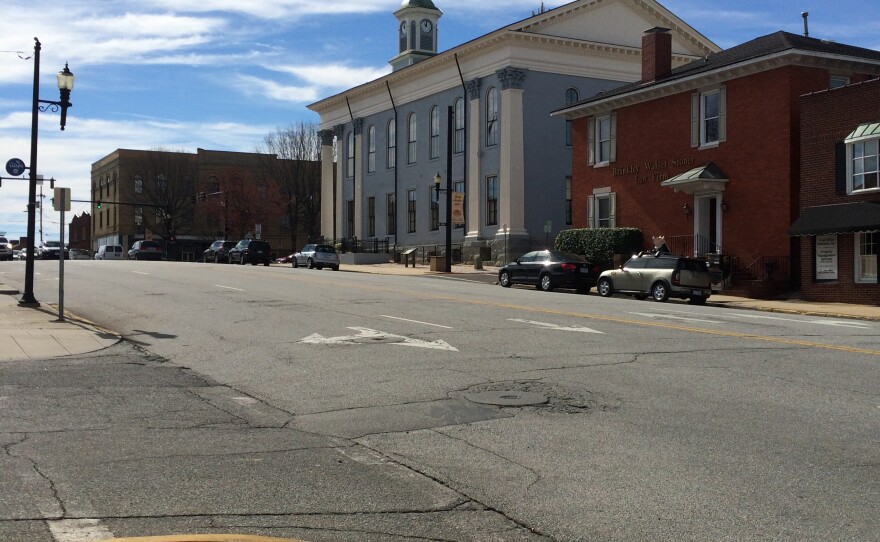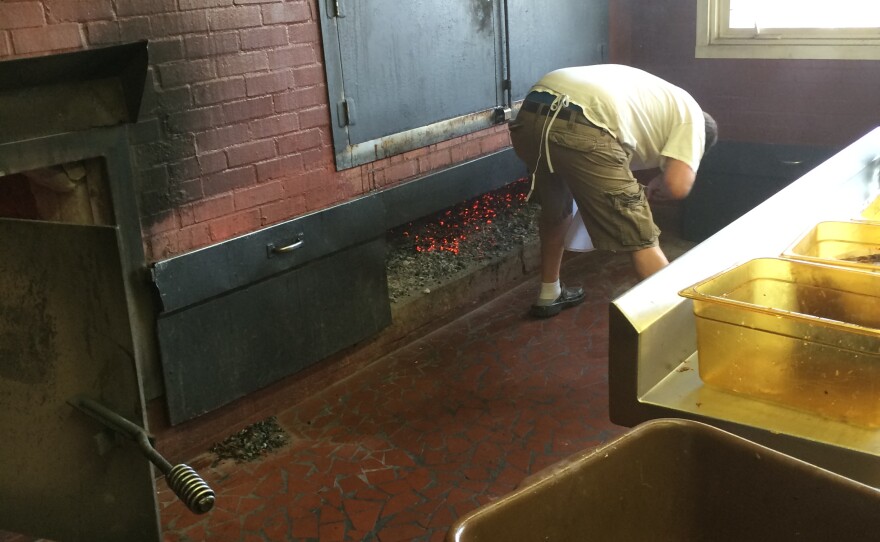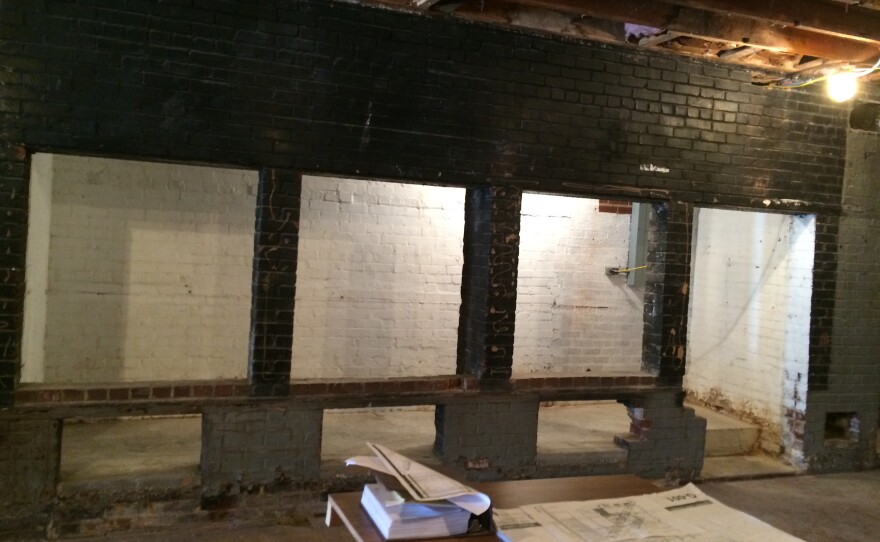The city that calls itself the Barbecue Capital of the World—Lexington, NC—got a little surprise when a construction crew uncovered a physical reminder of just how engrained barbecue is in the city and state.
This story about barbecue actually starts in a city hall annex building. It needed an overhaul so they began construction.
They checked the wiring and pulled back walls. And that’s when City Manager Alan Carson found something unexpected: barbecue pits that had been plastered over.
These pits once belonged to a local barbeque legend – Alton Beck. From 1949 to 1979, this building was home to Beck’s Barbeque. The pits look like a long brick hallway. You can see where the wood would have been placed and burned below and where the pork shoulders would have been stacked above.
Back in the 1940s and 1950s, Beck’s Barbecue was one of the places to be. The smell of cooking pork hung in the air from open to close.
Charles Stamey remembers it well growing up in Lexington. Stamey is part of another Lexington barbeque dynasty. He ran the restaurant his father started, called Stamey’s. His son runs the business today in Greensboro.
He says barbecue and local government have always had a connection on this particular street.
The city hall building (formerly Beck's Barbeque) is on West Center Street. The next street over is Greensboro, part of that road is known as “Barbecue Alley.” By the 1920s, barbecue pitmasters cooked beneath tents and sold barbecue sandwiches to people who came to do business at the courthouse across the street.
The area around the courthouse was unofficially known as “Lawyer’s Row,” because, well that’s where all the lawyers where. This location was key. It made barbecue a destination—it became Lexington’s signature food.
"The court day was a like a festival. They would joke that the judge would smell the barbecue smoke, it was wafting up and they would recess for lunch and everyone would come down and eat," Stamey says.
It also was an easy way to start a business, especially during the Great Depression, Stamey says.
"You could do a pretty nice business without a lot of trouble getting into business," Stamey reflects.
He describes the barbecue business back then as a humble one, with no refrigeration they were motivated to sell as much as they could in a day.
Stamey says to those families that made up Lexington’s barbecue infrastructure, it was this hard work that made them value the food. Because as cheesy as it sounds, barbecue gave back to the people of Lexington. It’s the city’s main attraction. Lexington, population 20,000, swells to around 200,000 during its annual barbecue festival, according to the city’s website.
After the discovery of the barbecue pits, it wasn’t a question of if they were going to keep them. The attitude was let's find a way to have our office space and barbecue history, too.
“It’s a unique feature. It was one we knew right away we were going to have to work to restore and keep. We weren’t going to have just a wall. We were going to have to do something with the pits in order to keep that heritage and that history in place. That’s our responsibility,” says Carson.
So the city is working with architects to preserve the pits and that history and move forward with redesigning the office space.
That’s good news for barbecue historian John Shelton Reed. He and his wife Dale are the authors of Holy Smoke: The big Book of North Carolina Barbecue.
Today he sees more of a push for uniformity across the state. Kind of like an International House of Pancakes but for barbecue.
"By the 1950s it was an intensely local thing you drive a 100 miles and the barbecue changes cooking different cuts of pork, not cooking pork at all, using a different sauce. You can tell where you are by what the barbecue looks and tastes like. Increasingly we’re going back to uniformity, with this thick red sweet sauces that sits on the surface like icing," Reed says.
To Reed barbecue isn’t just about the food. It’s about the businesses generated from the food. The sense of community it provided for those who cooked it and those who ate. It’s about the pitmasters who are up before the sun each day cooking over sweltering pits.
Places like a restaurant simply called Lexington Barbecue (or if you're a local, Honey Monk's). Locals call it the Honey Monk, for the combined name of the original pair of owners, Honey Cut and Wayne Monk. Today, it’s still run by the Monk family.
Ricky Monk’s father opened Lexington Barbeque in 1962. Ricky’s been working here for over 40 years, and his son works at the restaurant too. So do two of his sisters, a brother in law, some cousins, nieces, nephews. His mom does bookkeeping. His dad Wayne is still involved.
Ricky wastes no time whisking me back through a crowded kitchen, to the main thing I came to see. The pits, functioning ones, that cook meat as we speak. The kitchen is hot and there’s no AC. Turkey legs and pork shoulders are cooking. And the smell of meat, hickory smoke, along with the sweet tangy vinegar sauce fill the air. When he opens the door to one of the pits, that smell hits you like a brick wall.
Using the pits, Ricky says, isn’t easy. There's a “hot spot” in the fire you have to find every day. It’s hard, sweaty work. But he says it’s the right way, the Lexington style way to cook, which is why he’s grateful the city is saving the pits in the municipal building.
When Ricky Monk talks barbecue, he inevitably ends up talking about family... For him, the discovery of the Beck’s Barbeque pits and the city’s plan to showcase them is like a memorial to the local families that built their lives on barbecue. As far as Ricky is concerned, it’s the foundation Lexington is built on. And it’s not going away anytime soon.
A longer version of this story originally aired on the podcast Gravy produced by Tina Antolini. You can listen to that story here.











